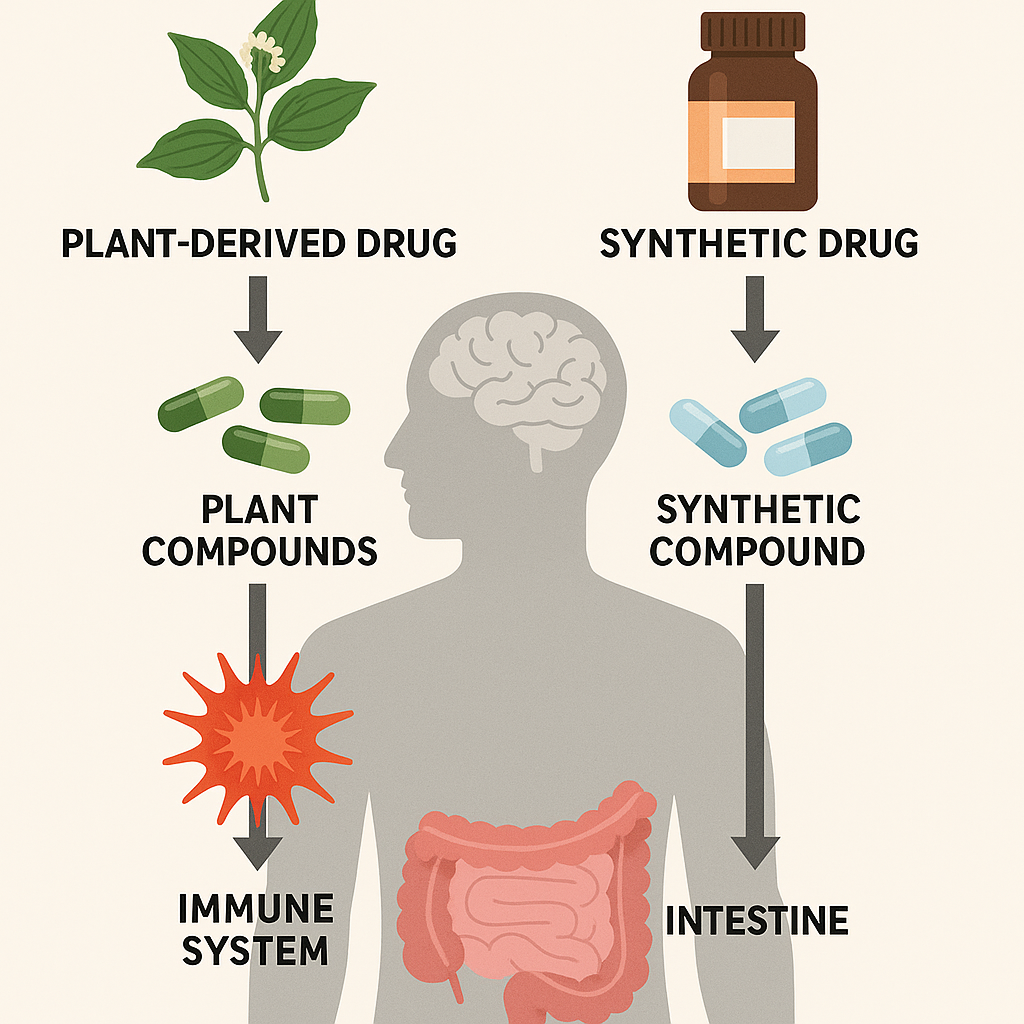The Supremacy of Nature?
A Scientific Analysis of Plant-Based Medicine Versus Synthetic Pharmaceuticals
Introduction
For thousands of years, humans have relied on the healing power of plants, minerals, and naturally occurring compounds. Long before the rise of modern pharmaceutical industries, medicine was drawn from forests, gardens, and rivers — a practice now known as phytotherapy or natural medicine. In recent decades, with growing concerns over drug dependency, side effects, and the overuse of antibiotics, interest in plant-based treatments has resurged.
This article examines the scientific basis for natural medicine’s advantages, the risks of overreliance on synthetic pharmaceuticals, and why the future may lie in a fusion of ancient knowledge and modern science.
Plant-Based Medicines: A Longstanding Relationship
Historical Legacy
- Ayurveda (India), Traditional Chinese Medicine, and indigenous healing systems across Africa and the Americas have long used herbs like turmeric, willow bark, echinacea, and ginseng for immune support, pain relief, and inflammation.
- Many modern synthetic drugs originate from plants:
- Aspirin from willow bark
- Morphine from the opium poppy
- Quinine from cinchona bark
- Digoxin from foxglove

Active Compounds and Synergy
Plants contain complex mixtures of bioactive compounds (alkaloids, flavonoids, terpenes, etc.), which may act synergistically, producing effects difficult to replicate in single-molecule pharmaceuticals. This multitarget activity can:
- Support broader systemic balance
- Reduce resistance buildup
- Minimize side effects (in certain cases)
Synthetic Pharmaceuticals: Power and Pitfalls
Potent but Isolated
Synthetic drugs are often designed for precision — targeting a single receptor, enzyme, or symptom. This can be life-saving in acute or critical care (e.g., insulin, antibiotics, antivirals, chemotherapy), but may also come with:
- Strong side effects
- Reduced tolerance over time
- Dependency (especially in psychoactive or pain medications)
Suppression of Natural Functions
A legitimate concern in medicine is that external substitutes may suppress endogenous production. For example:
- Corticosteroids can reduce adrenal gland output with long-term use
- Antibiotics, while lifesaving, can disturb the gut microbiome, weakening immunity
- Opioids can blunt natural endorphin systems
- Exogenous hormones may downregulate hormonal feedback loops
This does not mean synthetic medicine is harmful by nature, but it underscores the importance of judicious use.
Antibiotics vs. Immune Resilience
Antibiotics are among the most overused synthetic drugs, leading to:
- Antibiotic resistance
- Microbiome depletion
- Immune dysregulation
Studies show that broad-spectrum antibiotics:
- Can kill beneficial gut flora (which play a role in immunity and digestion)
- May be linked to increased risks of autoimmune disorders, allergies, and mood imbalances
By contrast, natural antimicrobials (e.g., garlic, thyme oil, berberine, propolis) often:
- Spare beneficial flora
- Target pathogens in less aggressive ways
- Work synergistically with the body’s immune responses

Dependency vs. Adaptation
One of the central critiques of conventional pharma is the potential for long-term dependency:
- Chronic symptom relief without treating root causes
- Polypharmacy in aging populations
- High costs and lifelong prescriptions
Natural medicine, when correctly applied:
- Supports homeostasis (natural balance)
- Encourages self-healing mechanisms
- Is often less toxic or habit-forming
However, it’s crucial to note:
Natural ≠ Automatically Safe.
Dosage, interactions, contamination, and individual differences must be considered scientifically.
A Converging Future: Integrative Medicine
The wisest path forward may not be to abandon synthetic medicine, but to integrate natural therapies with modern diagnostics and pharmacology.
Evidence-based integrative medicine combines:
- Herbal protocols with clinical trials
- Lifestyle, nutrition, and mind-body practices
- Selective use of pharmaceuticals when necessary
This hybrid approach honors traditional wisdom while maintaining scientific rigor.
Conclusion
The supremacy of natural medicine is not absolute — but it is resilient, holistic, and often underappreciated in modern medical systems. While synthetic drugs have revolutionized acute care and saved millions of lives, they must be used responsibly and not at the expense of the body’s self-regulatory capacity.
Let food — and forests — be thy medicine, with science as thy compass.

